DMU - Leadership and Culture in Organizational Contexts Essay
VerifiedAdded on 2023/06/11
|18
|4837
|306
Essay
AI Summary
This essay explores the intertwined concepts of leadership and organizational culture, emphasizing the significance of character, ethical values, and various leadership theories. It defines leadership and character, highlighting the importance of ethical behavior and trust in leadership. The essay contextualizes leadership theories like the Great Man Theory, Trait Theory, and Emotional Leadership Styles, providing practical examples such as Nelson Mandela's leadership and ethical dilemmas in organizations like British Petroleum and hospitals. Furthermore, it discusses traditional versus modern leadership styles, the debate on whether leaders are born or made, and the challenges faced by young leaders, demonstrating the multifaceted nature of leadership in diverse organizational settings. This resource is available on Desklib, a platform offering a wide range of academic materials and study tools for students.
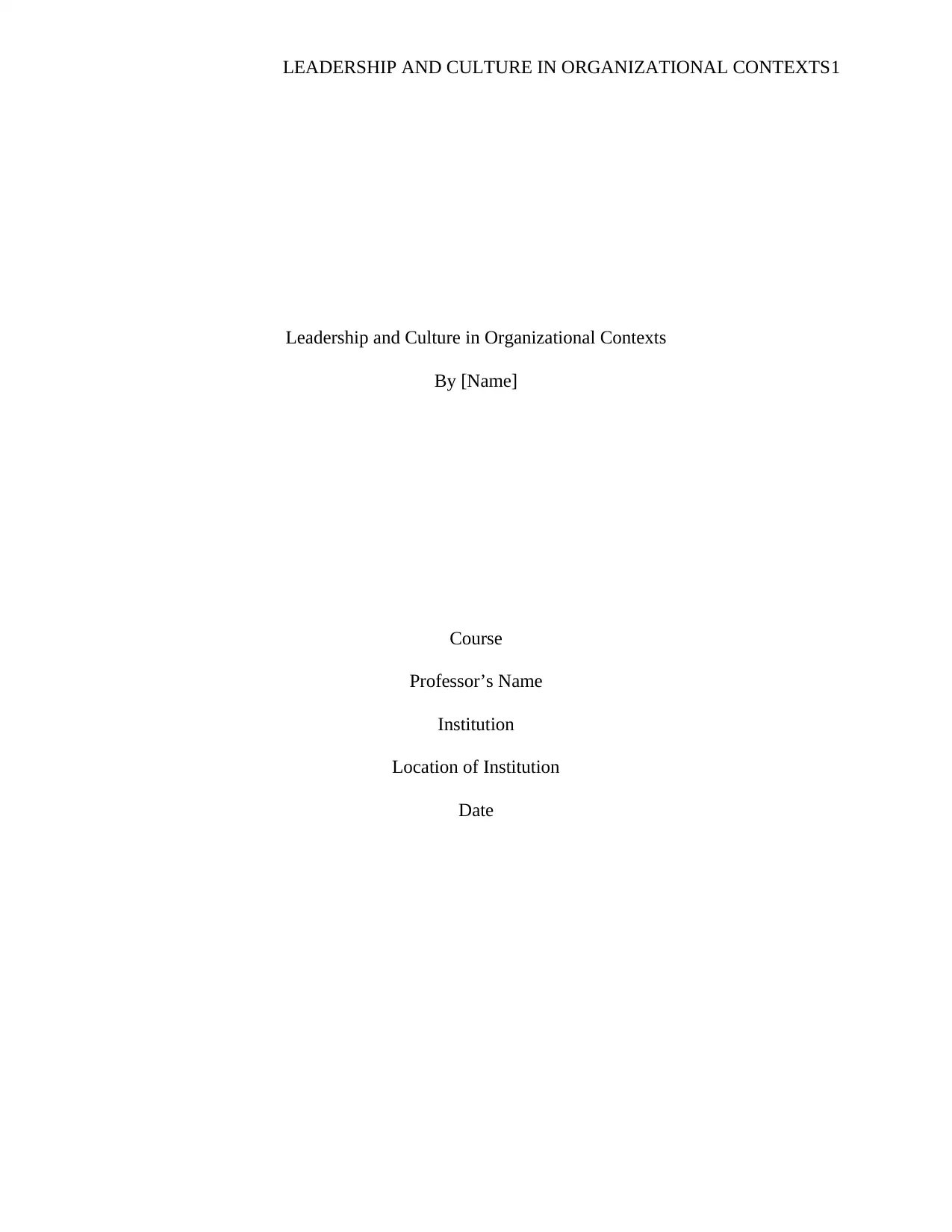
LEADERSHIP AND CULTURE IN ORGANIZATIONAL CONTEXTS1
Leadership and Culture in Organizational Contexts
By [Name]
Course
Professor’s Name
Institution
Location of Institution
Date
Leadership and Culture in Organizational Contexts
By [Name]
Course
Professor’s Name
Institution
Location of Institution
Date
Paraphrase This Document
Need a fresh take? Get an instant paraphrase of this document with our AI Paraphraser
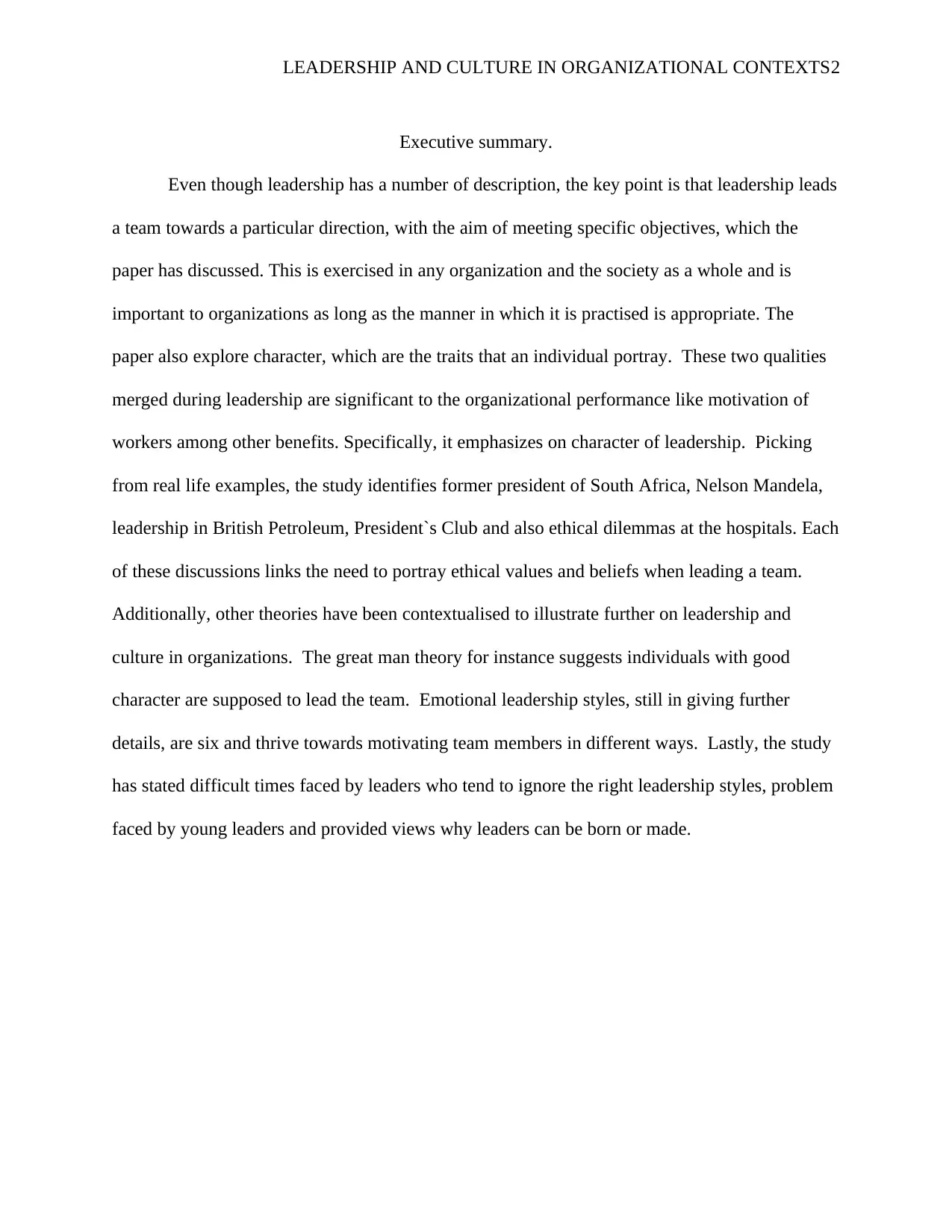
LEADERSHIP AND CULTURE IN ORGANIZATIONAL CONTEXTS2
Executive summary.
Even though leadership has a number of description, the key point is that leadership leads
a team towards a particular direction, with the aim of meeting specific objectives, which the
paper has discussed. This is exercised in any organization and the society as a whole and is
important to organizations as long as the manner in which it is practised is appropriate. The
paper also explore character, which are the traits that an individual portray. These two qualities
merged during leadership are significant to the organizational performance like motivation of
workers among other benefits. Specifically, it emphasizes on character of leadership. Picking
from real life examples, the study identifies former president of South Africa, Nelson Mandela,
leadership in British Petroleum, President`s Club and also ethical dilemmas at the hospitals. Each
of these discussions links the need to portray ethical values and beliefs when leading a team.
Additionally, other theories have been contextualised to illustrate further on leadership and
culture in organizations. The great man theory for instance suggests individuals with good
character are supposed to lead the team. Emotional leadership styles, still in giving further
details, are six and thrive towards motivating team members in different ways. Lastly, the study
has stated difficult times faced by leaders who tend to ignore the right leadership styles, problem
faced by young leaders and provided views why leaders can be born or made.
Executive summary.
Even though leadership has a number of description, the key point is that leadership leads
a team towards a particular direction, with the aim of meeting specific objectives, which the
paper has discussed. This is exercised in any organization and the society as a whole and is
important to organizations as long as the manner in which it is practised is appropriate. The
paper also explore character, which are the traits that an individual portray. These two qualities
merged during leadership are significant to the organizational performance like motivation of
workers among other benefits. Specifically, it emphasizes on character of leadership. Picking
from real life examples, the study identifies former president of South Africa, Nelson Mandela,
leadership in British Petroleum, President`s Club and also ethical dilemmas at the hospitals. Each
of these discussions links the need to portray ethical values and beliefs when leading a team.
Additionally, other theories have been contextualised to illustrate further on leadership and
culture in organizations. The great man theory for instance suggests individuals with good
character are supposed to lead the team. Emotional leadership styles, still in giving further
details, are six and thrive towards motivating team members in different ways. Lastly, the study
has stated difficult times faced by leaders who tend to ignore the right leadership styles, problem
faced by young leaders and provided views why leaders can be born or made.
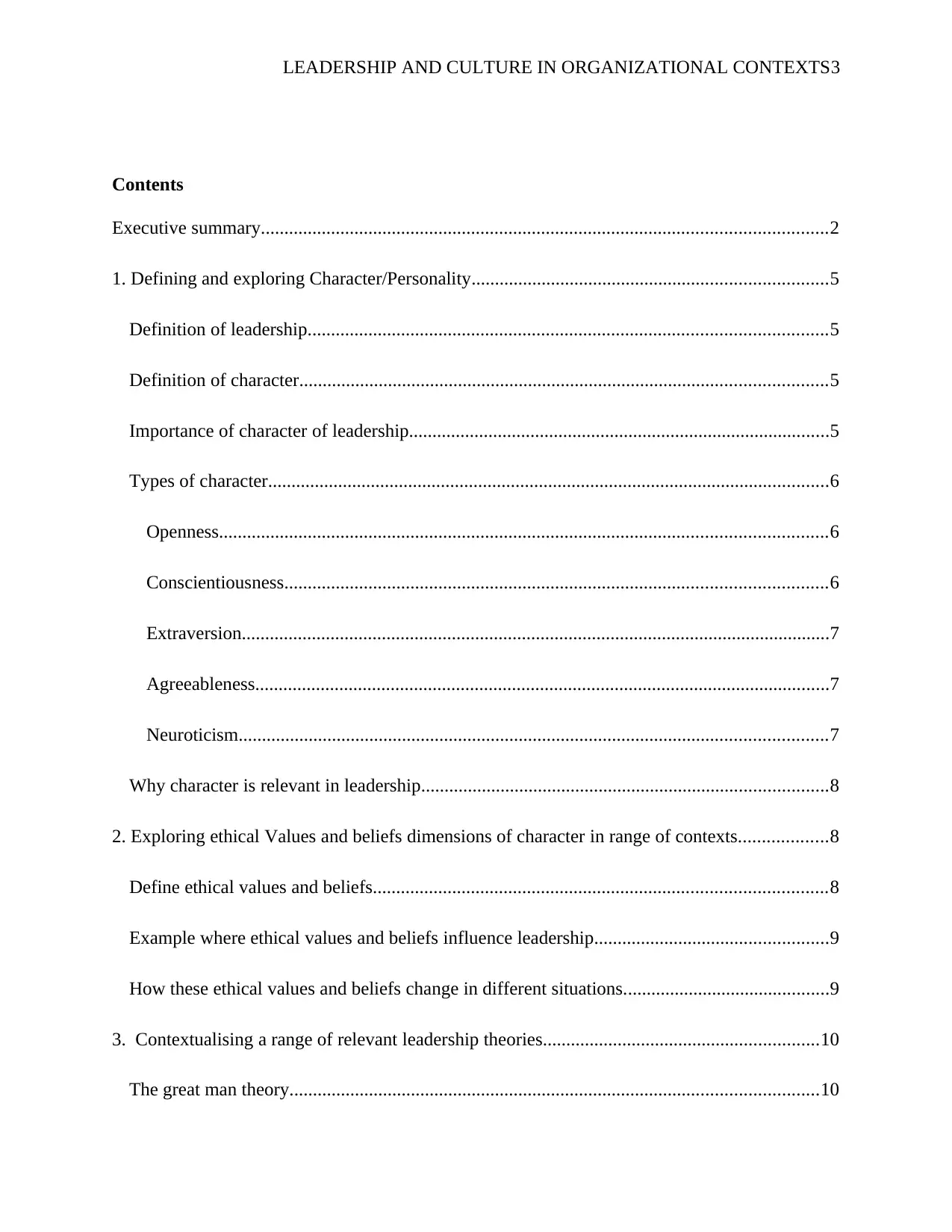
LEADERSHIP AND CULTURE IN ORGANIZATIONAL CONTEXTS3
Contents
Executive summary.........................................................................................................................2
1. Defining and exploring Character/Personality............................................................................5
Definition of leadership...............................................................................................................5
Definition of character.................................................................................................................5
Importance of character of leadership..........................................................................................5
Types of character........................................................................................................................6
Openness..................................................................................................................................6
Conscientiousness....................................................................................................................6
Extraversion..............................................................................................................................7
Agreeableness...........................................................................................................................7
Neuroticism..............................................................................................................................7
Why character is relevant in leadership.......................................................................................8
2. Exploring ethical Values and beliefs dimensions of character in range of contexts...................8
Define ethical values and beliefs.................................................................................................8
Example where ethical values and beliefs influence leadership..................................................9
How these ethical values and beliefs change in different situations............................................9
3. Contextualising a range of relevant leadership theories...........................................................10
The great man theory.................................................................................................................10
Contents
Executive summary.........................................................................................................................2
1. Defining and exploring Character/Personality............................................................................5
Definition of leadership...............................................................................................................5
Definition of character.................................................................................................................5
Importance of character of leadership..........................................................................................5
Types of character........................................................................................................................6
Openness..................................................................................................................................6
Conscientiousness....................................................................................................................6
Extraversion..............................................................................................................................7
Agreeableness...........................................................................................................................7
Neuroticism..............................................................................................................................7
Why character is relevant in leadership.......................................................................................8
2. Exploring ethical Values and beliefs dimensions of character in range of contexts...................8
Define ethical values and beliefs.................................................................................................8
Example where ethical values and beliefs influence leadership..................................................9
How these ethical values and beliefs change in different situations............................................9
3. Contextualising a range of relevant leadership theories...........................................................10
The great man theory.................................................................................................................10
⊘ This is a preview!⊘
Do you want full access?
Subscribe today to unlock all pages.

Trusted by 1+ million students worldwide
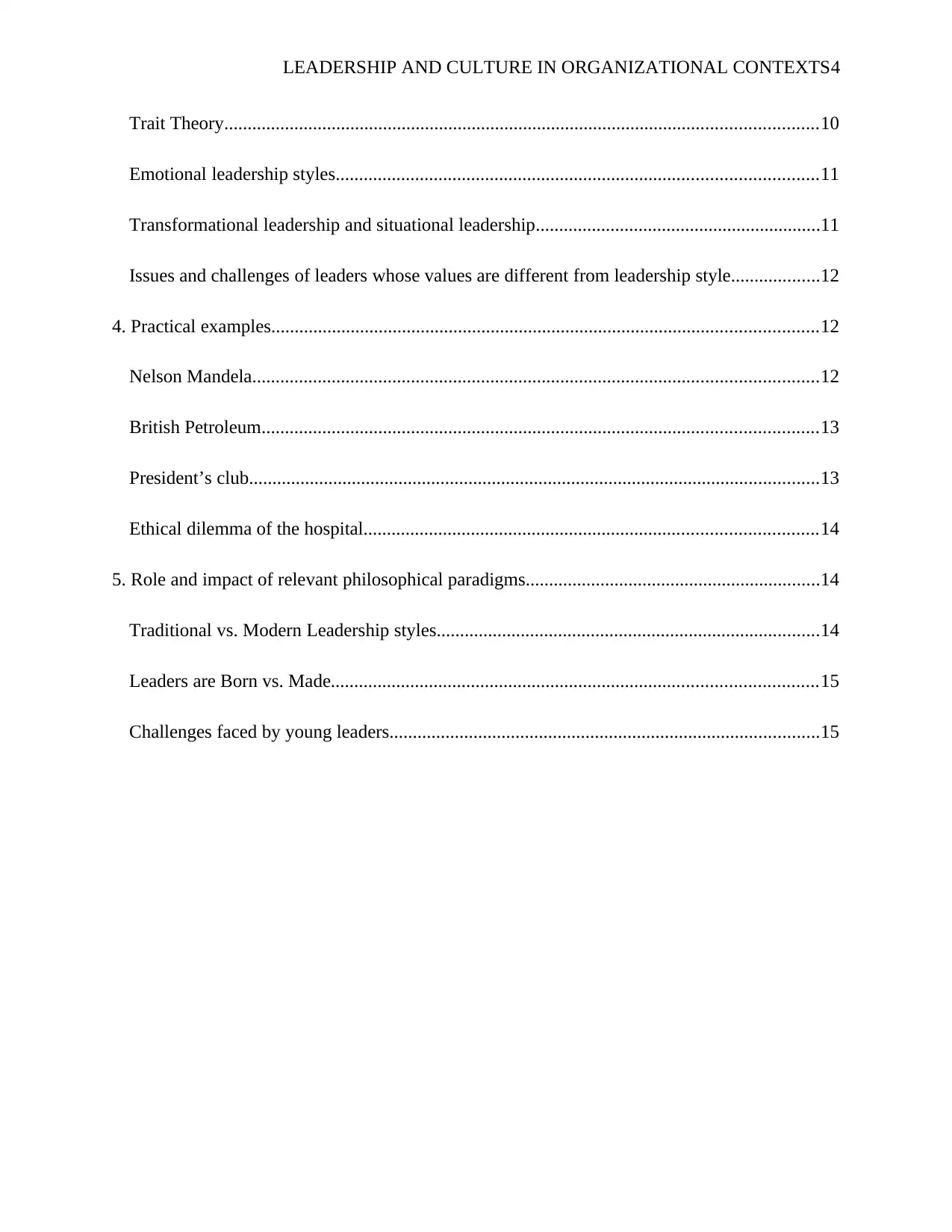
LEADERSHIP AND CULTURE IN ORGANIZATIONAL CONTEXTS4
Trait Theory...............................................................................................................................10
Emotional leadership styles.......................................................................................................11
Transformational leadership and situational leadership.............................................................11
Issues and challenges of leaders whose values are different from leadership style...................12
4. Practical examples.....................................................................................................................12
Nelson Mandela.........................................................................................................................12
British Petroleum.......................................................................................................................13
President’s club..........................................................................................................................13
Ethical dilemma of the hospital.................................................................................................14
5. Role and impact of relevant philosophical paradigms...............................................................14
Traditional vs. Modern Leadership styles..................................................................................14
Leaders are Born vs. Made........................................................................................................15
Challenges faced by young leaders............................................................................................15
Trait Theory...............................................................................................................................10
Emotional leadership styles.......................................................................................................11
Transformational leadership and situational leadership.............................................................11
Issues and challenges of leaders whose values are different from leadership style...................12
4. Practical examples.....................................................................................................................12
Nelson Mandela.........................................................................................................................12
British Petroleum.......................................................................................................................13
President’s club..........................................................................................................................13
Ethical dilemma of the hospital.................................................................................................14
5. Role and impact of relevant philosophical paradigms...............................................................14
Traditional vs. Modern Leadership styles..................................................................................14
Leaders are Born vs. Made........................................................................................................15
Challenges faced by young leaders............................................................................................15
Paraphrase This Document
Need a fresh take? Get an instant paraphrase of this document with our AI Paraphraser
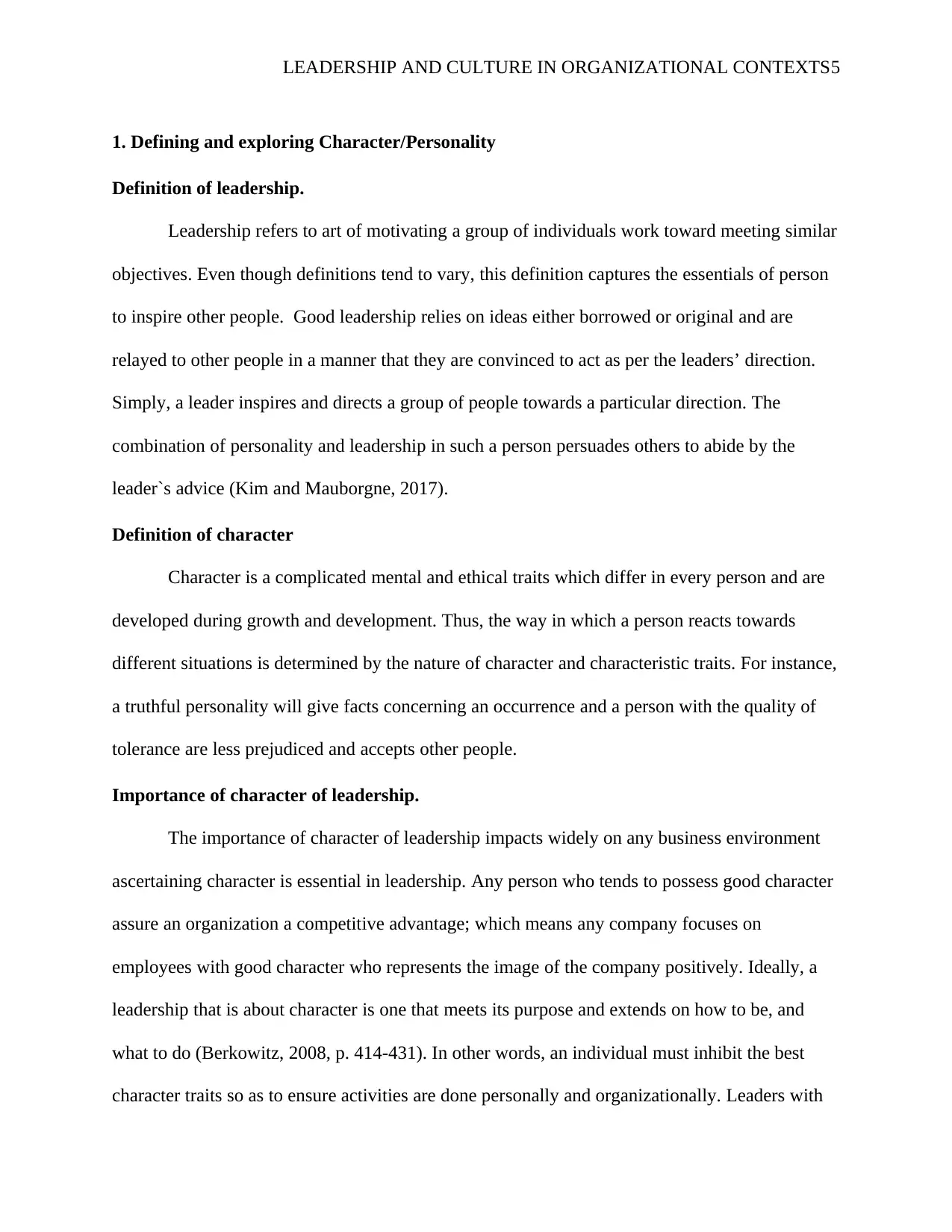
LEADERSHIP AND CULTURE IN ORGANIZATIONAL CONTEXTS5
1. Defining and exploring Character/Personality
Definition of leadership.
Leadership refers to art of motivating a group of individuals work toward meeting similar
objectives. Even though definitions tend to vary, this definition captures the essentials of person
to inspire other people. Good leadership relies on ideas either borrowed or original and are
relayed to other people in a manner that they are convinced to act as per the leaders’ direction.
Simply, a leader inspires and directs a group of people towards a particular direction. The
combination of personality and leadership in such a person persuades others to abide by the
leader`s advice (Kim and Mauborgne, 2017).
Definition of character
Character is a complicated mental and ethical traits which differ in every person and are
developed during growth and development. Thus, the way in which a person reacts towards
different situations is determined by the nature of character and characteristic traits. For instance,
a truthful personality will give facts concerning an occurrence and a person with the quality of
tolerance are less prejudiced and accepts other people.
Importance of character of leadership.
The importance of character of leadership impacts widely on any business environment
ascertaining character is essential in leadership. Any person who tends to possess good character
assure an organization a competitive advantage; which means any company focuses on
employees with good character who represents the image of the company positively. Ideally, a
leadership that is about character is one that meets its purpose and extends on how to be, and
what to do (Berkowitz, 2008, p. 414-431). In other words, an individual must inhibit the best
character traits so as to ensure activities are done personally and organizationally. Leaders with
1. Defining and exploring Character/Personality
Definition of leadership.
Leadership refers to art of motivating a group of individuals work toward meeting similar
objectives. Even though definitions tend to vary, this definition captures the essentials of person
to inspire other people. Good leadership relies on ideas either borrowed or original and are
relayed to other people in a manner that they are convinced to act as per the leaders’ direction.
Simply, a leader inspires and directs a group of people towards a particular direction. The
combination of personality and leadership in such a person persuades others to abide by the
leader`s advice (Kim and Mauborgne, 2017).
Definition of character
Character is a complicated mental and ethical traits which differ in every person and are
developed during growth and development. Thus, the way in which a person reacts towards
different situations is determined by the nature of character and characteristic traits. For instance,
a truthful personality will give facts concerning an occurrence and a person with the quality of
tolerance are less prejudiced and accepts other people.
Importance of character of leadership.
The importance of character of leadership impacts widely on any business environment
ascertaining character is essential in leadership. Any person who tends to possess good character
assure an organization a competitive advantage; which means any company focuses on
employees with good character who represents the image of the company positively. Ideally, a
leadership that is about character is one that meets its purpose and extends on how to be, and
what to do (Berkowitz, 2008, p. 414-431). In other words, an individual must inhibit the best
character traits so as to ensure activities are done personally and organizationally. Leaders with
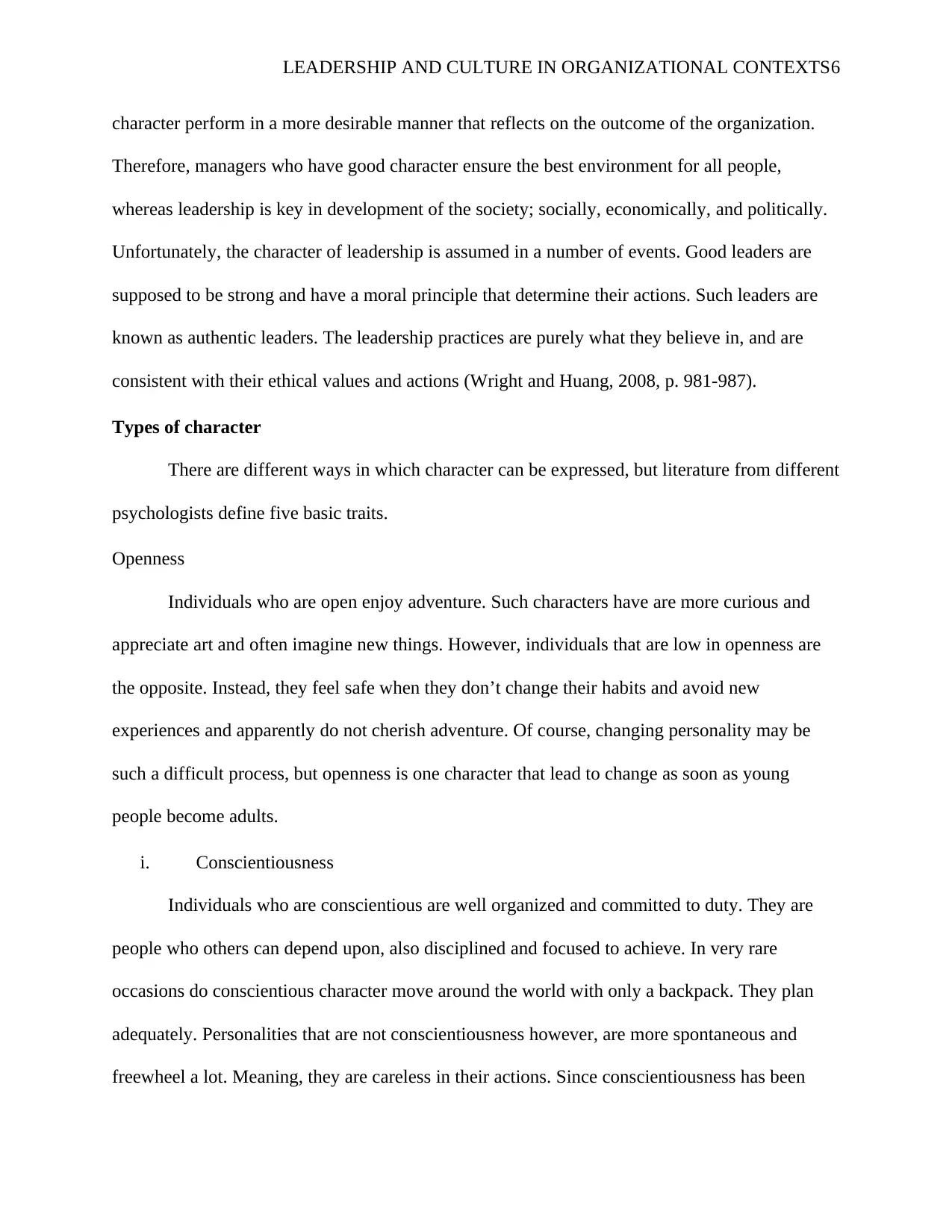
LEADERSHIP AND CULTURE IN ORGANIZATIONAL CONTEXTS6
character perform in a more desirable manner that reflects on the outcome of the organization.
Therefore, managers who have good character ensure the best environment for all people,
whereas leadership is key in development of the society; socially, economically, and politically.
Unfortunately, the character of leadership is assumed in a number of events. Good leaders are
supposed to be strong and have a moral principle that determine their actions. Such leaders are
known as authentic leaders. The leadership practices are purely what they believe in, and are
consistent with their ethical values and actions (Wright and Huang, 2008, p. 981-987).
Types of character
There are different ways in which character can be expressed, but literature from different
psychologists define five basic traits.
Openness
Individuals who are open enjoy adventure. Such characters have are more curious and
appreciate art and often imagine new things. However, individuals that are low in openness are
the opposite. Instead, they feel safe when they don’t change their habits and avoid new
experiences and apparently do not cherish adventure. Of course, changing personality may be
such a difficult process, but openness is one character that lead to change as soon as young
people become adults.
i. Conscientiousness
Individuals who are conscientious are well organized and committed to duty. They are
people who others can depend upon, also disciplined and focused to achieve. In very rare
occasions do conscientious character move around the world with only a backpack. They plan
adequately. Personalities that are not conscientiousness however, are more spontaneous and
freewheel a lot. Meaning, they are careless in their actions. Since conscientiousness has been
character perform in a more desirable manner that reflects on the outcome of the organization.
Therefore, managers who have good character ensure the best environment for all people,
whereas leadership is key in development of the society; socially, economically, and politically.
Unfortunately, the character of leadership is assumed in a number of events. Good leaders are
supposed to be strong and have a moral principle that determine their actions. Such leaders are
known as authentic leaders. The leadership practices are purely what they believe in, and are
consistent with their ethical values and actions (Wright and Huang, 2008, p. 981-987).
Types of character
There are different ways in which character can be expressed, but literature from different
psychologists define five basic traits.
Openness
Individuals who are open enjoy adventure. Such characters have are more curious and
appreciate art and often imagine new things. However, individuals that are low in openness are
the opposite. Instead, they feel safe when they don’t change their habits and avoid new
experiences and apparently do not cherish adventure. Of course, changing personality may be
such a difficult process, but openness is one character that lead to change as soon as young
people become adults.
i. Conscientiousness
Individuals who are conscientious are well organized and committed to duty. They are
people who others can depend upon, also disciplined and focused to achieve. In very rare
occasions do conscientious character move around the world with only a backpack. They plan
adequately. Personalities that are not conscientiousness however, are more spontaneous and
freewheel a lot. Meaning, they are careless in their actions. Since conscientiousness has been
⊘ This is a preview!⊘
Do you want full access?
Subscribe today to unlock all pages.

Trusted by 1+ million students worldwide
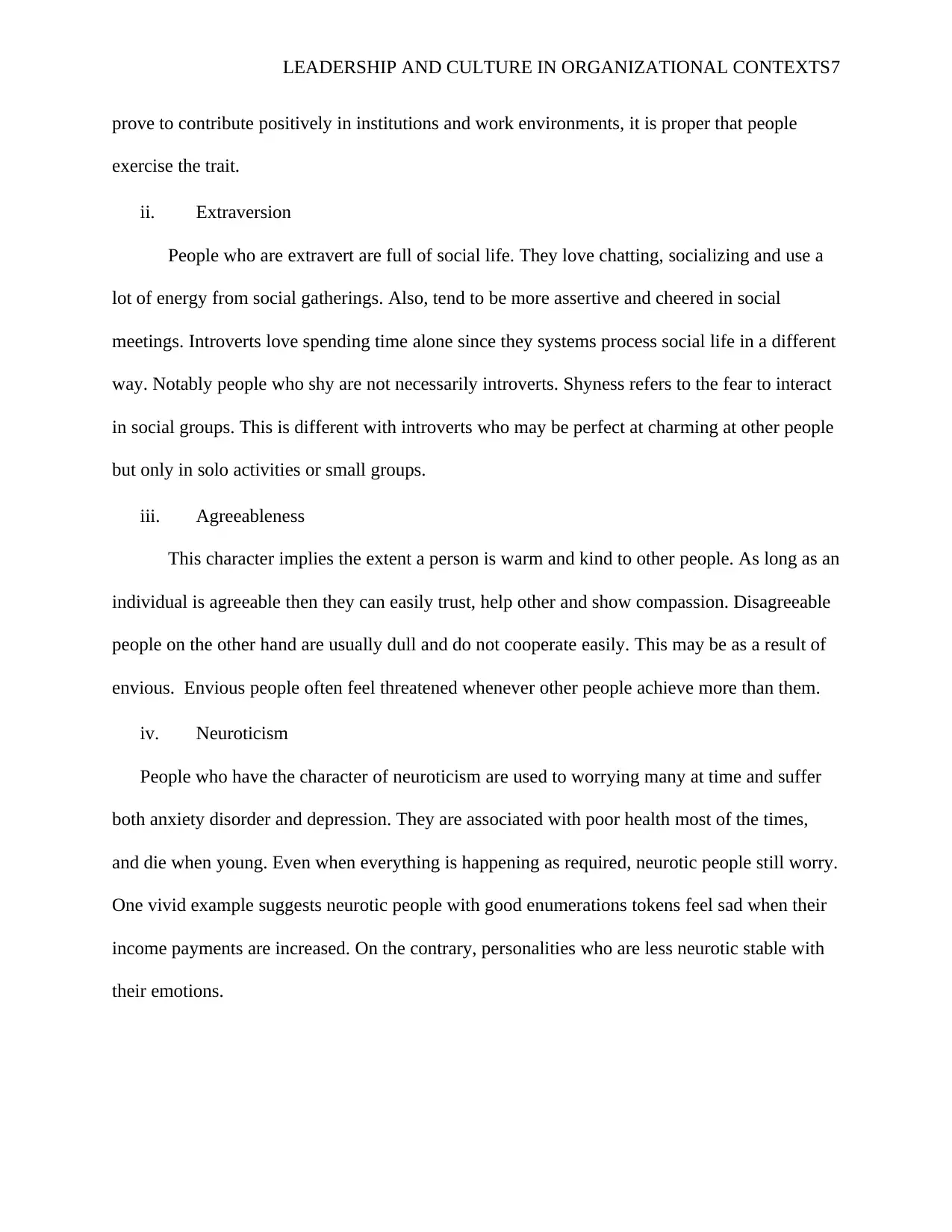
LEADERSHIP AND CULTURE IN ORGANIZATIONAL CONTEXTS7
prove to contribute positively in institutions and work environments, it is proper that people
exercise the trait.
ii. Extraversion
People who are extravert are full of social life. They love chatting, socializing and use a
lot of energy from social gatherings. Also, tend to be more assertive and cheered in social
meetings. Introverts love spending time alone since they systems process social life in a different
way. Notably people who shy are not necessarily introverts. Shyness refers to the fear to interact
in social groups. This is different with introverts who may be perfect at charming at other people
but only in solo activities or small groups.
iii. Agreeableness
This character implies the extent a person is warm and kind to other people. As long as an
individual is agreeable then they can easily trust, help other and show compassion. Disagreeable
people on the other hand are usually dull and do not cooperate easily. This may be as a result of
envious. Envious people often feel threatened whenever other people achieve more than them.
iv. Neuroticism
People who have the character of neuroticism are used to worrying many at time and suffer
both anxiety disorder and depression. They are associated with poor health most of the times,
and die when young. Even when everything is happening as required, neurotic people still worry.
One vivid example suggests neurotic people with good enumerations tokens feel sad when their
income payments are increased. On the contrary, personalities who are less neurotic stable with
their emotions.
prove to contribute positively in institutions and work environments, it is proper that people
exercise the trait.
ii. Extraversion
People who are extravert are full of social life. They love chatting, socializing and use a
lot of energy from social gatherings. Also, tend to be more assertive and cheered in social
meetings. Introverts love spending time alone since they systems process social life in a different
way. Notably people who shy are not necessarily introverts. Shyness refers to the fear to interact
in social groups. This is different with introverts who may be perfect at charming at other people
but only in solo activities or small groups.
iii. Agreeableness
This character implies the extent a person is warm and kind to other people. As long as an
individual is agreeable then they can easily trust, help other and show compassion. Disagreeable
people on the other hand are usually dull and do not cooperate easily. This may be as a result of
envious. Envious people often feel threatened whenever other people achieve more than them.
iv. Neuroticism
People who have the character of neuroticism are used to worrying many at time and suffer
both anxiety disorder and depression. They are associated with poor health most of the times,
and die when young. Even when everything is happening as required, neurotic people still worry.
One vivid example suggests neurotic people with good enumerations tokens feel sad when their
income payments are increased. On the contrary, personalities who are less neurotic stable with
their emotions.
Paraphrase This Document
Need a fresh take? Get an instant paraphrase of this document with our AI Paraphraser
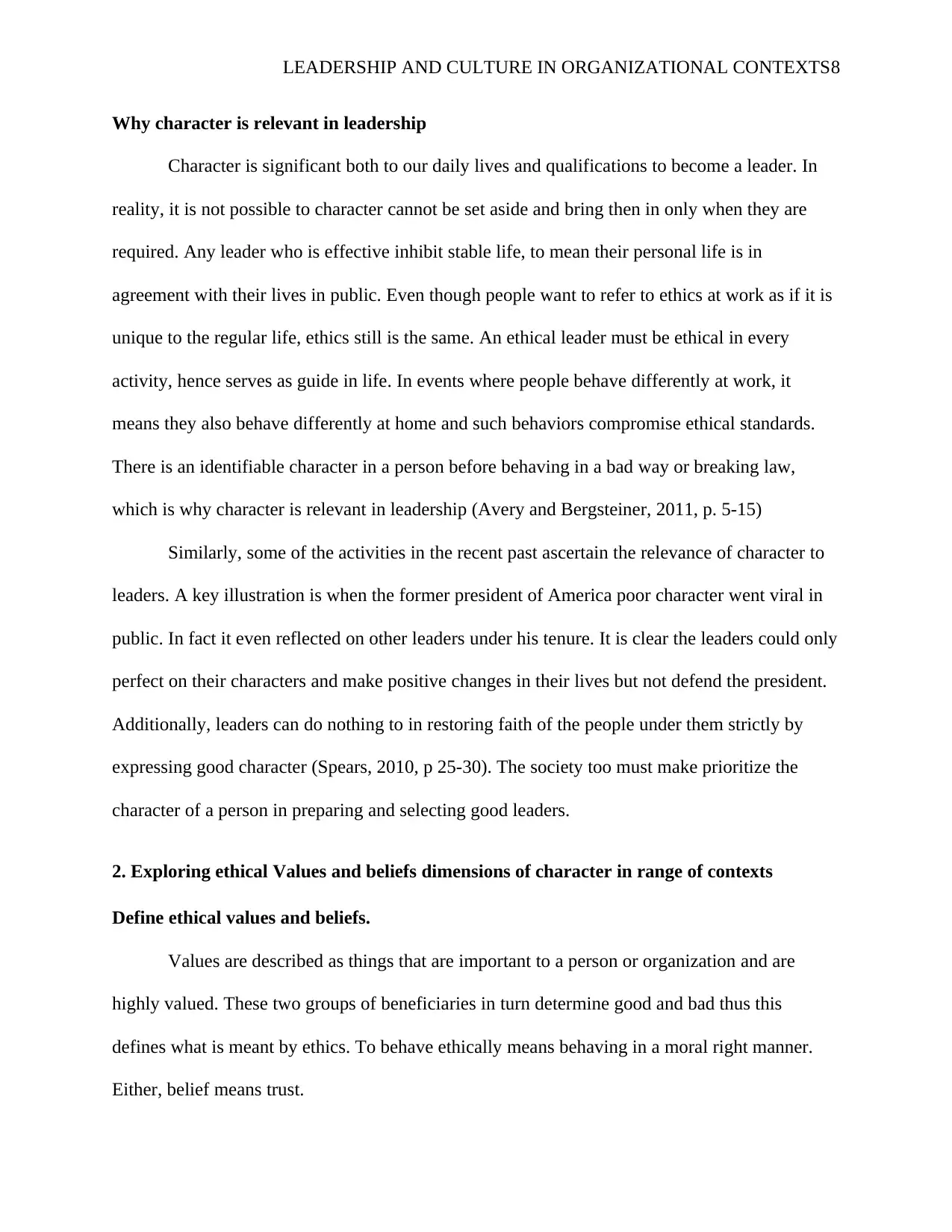
LEADERSHIP AND CULTURE IN ORGANIZATIONAL CONTEXTS8
Why character is relevant in leadership
Character is significant both to our daily lives and qualifications to become a leader. In
reality, it is not possible to character cannot be set aside and bring then in only when they are
required. Any leader who is effective inhibit stable life, to mean their personal life is in
agreement with their lives in public. Even though people want to refer to ethics at work as if it is
unique to the regular life, ethics still is the same. An ethical leader must be ethical in every
activity, hence serves as guide in life. In events where people behave differently at work, it
means they also behave differently at home and such behaviors compromise ethical standards.
There is an identifiable character in a person before behaving in a bad way or breaking law,
which is why character is relevant in leadership (Avery and Bergsteiner, 2011, p. 5-15)
Similarly, some of the activities in the recent past ascertain the relevance of character to
leaders. A key illustration is when the former president of America poor character went viral in
public. In fact it even reflected on other leaders under his tenure. It is clear the leaders could only
perfect on their characters and make positive changes in their lives but not defend the president.
Additionally, leaders can do nothing to in restoring faith of the people under them strictly by
expressing good character (Spears, 2010, p 25-30). The society too must make prioritize the
character of a person in preparing and selecting good leaders.
2. Exploring ethical Values and beliefs dimensions of character in range of contexts
Define ethical values and beliefs.
Values are described as things that are important to a person or organization and are
highly valued. These two groups of beneficiaries in turn determine good and bad thus this
defines what is meant by ethics. To behave ethically means behaving in a moral right manner.
Either, belief means trust.
Why character is relevant in leadership
Character is significant both to our daily lives and qualifications to become a leader. In
reality, it is not possible to character cannot be set aside and bring then in only when they are
required. Any leader who is effective inhibit stable life, to mean their personal life is in
agreement with their lives in public. Even though people want to refer to ethics at work as if it is
unique to the regular life, ethics still is the same. An ethical leader must be ethical in every
activity, hence serves as guide in life. In events where people behave differently at work, it
means they also behave differently at home and such behaviors compromise ethical standards.
There is an identifiable character in a person before behaving in a bad way or breaking law,
which is why character is relevant in leadership (Avery and Bergsteiner, 2011, p. 5-15)
Similarly, some of the activities in the recent past ascertain the relevance of character to
leaders. A key illustration is when the former president of America poor character went viral in
public. In fact it even reflected on other leaders under his tenure. It is clear the leaders could only
perfect on their characters and make positive changes in their lives but not defend the president.
Additionally, leaders can do nothing to in restoring faith of the people under them strictly by
expressing good character (Spears, 2010, p 25-30). The society too must make prioritize the
character of a person in preparing and selecting good leaders.
2. Exploring ethical Values and beliefs dimensions of character in range of contexts
Define ethical values and beliefs.
Values are described as things that are important to a person or organization and are
highly valued. These two groups of beneficiaries in turn determine good and bad thus this
defines what is meant by ethics. To behave ethically means behaving in a moral right manner.
Either, belief means trust.
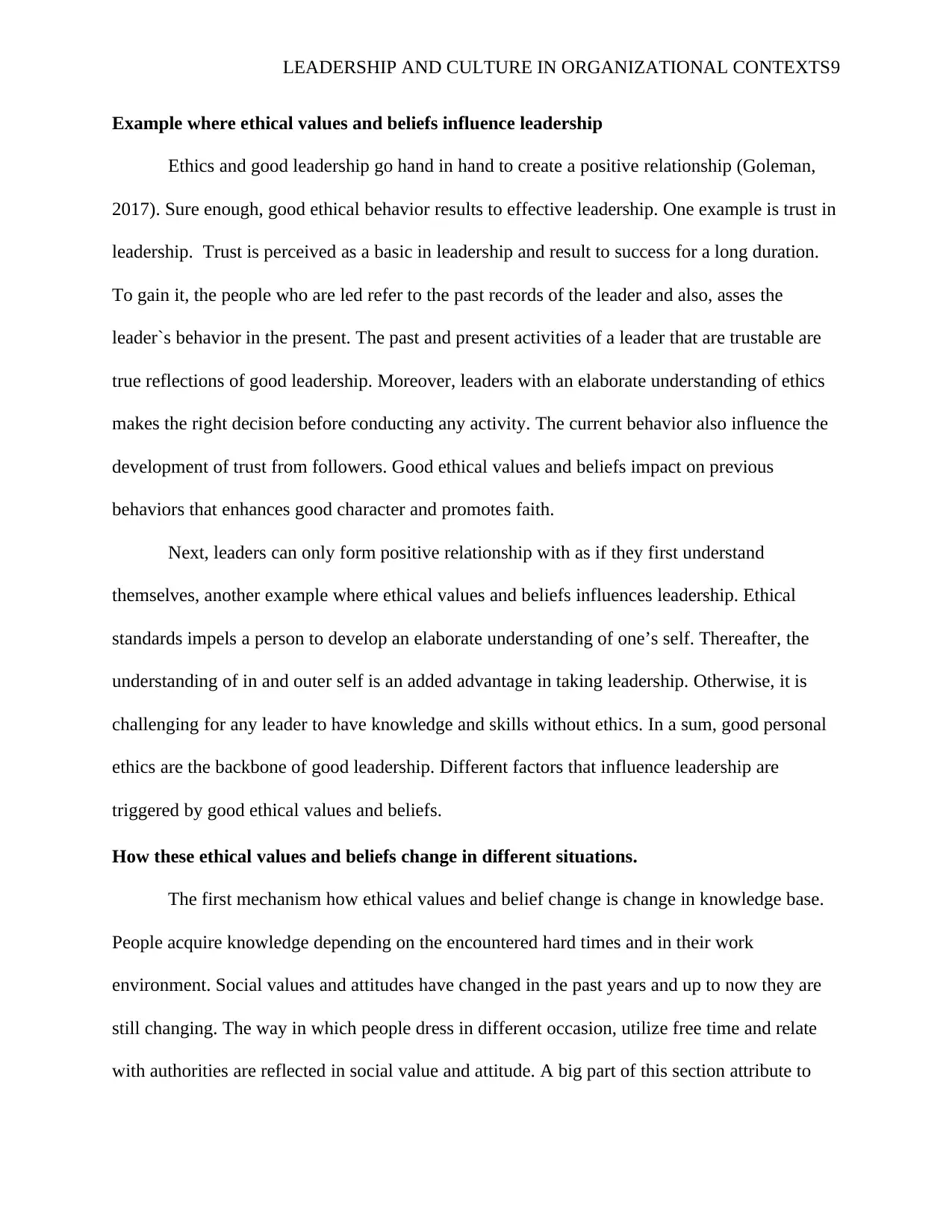
LEADERSHIP AND CULTURE IN ORGANIZATIONAL CONTEXTS9
Example where ethical values and beliefs influence leadership
Ethics and good leadership go hand in hand to create a positive relationship (Goleman,
2017). Sure enough, good ethical behavior results to effective leadership. One example is trust in
leadership. Trust is perceived as a basic in leadership and result to success for a long duration.
To gain it, the people who are led refer to the past records of the leader and also, asses the
leader`s behavior in the present. The past and present activities of a leader that are trustable are
true reflections of good leadership. Moreover, leaders with an elaborate understanding of ethics
makes the right decision before conducting any activity. The current behavior also influence the
development of trust from followers. Good ethical values and beliefs impact on previous
behaviors that enhances good character and promotes faith.
Next, leaders can only form positive relationship with as if they first understand
themselves, another example where ethical values and beliefs influences leadership. Ethical
standards impels a person to develop an elaborate understanding of one’s self. Thereafter, the
understanding of in and outer self is an added advantage in taking leadership. Otherwise, it is
challenging for any leader to have knowledge and skills without ethics. In a sum, good personal
ethics are the backbone of good leadership. Different factors that influence leadership are
triggered by good ethical values and beliefs.
How these ethical values and beliefs change in different situations.
The first mechanism how ethical values and belief change is change in knowledge base.
People acquire knowledge depending on the encountered hard times and in their work
environment. Social values and attitudes have changed in the past years and up to now they are
still changing. The way in which people dress in different occasion, utilize free time and relate
with authorities are reflected in social value and attitude. A big part of this section attribute to
Example where ethical values and beliefs influence leadership
Ethics and good leadership go hand in hand to create a positive relationship (Goleman,
2017). Sure enough, good ethical behavior results to effective leadership. One example is trust in
leadership. Trust is perceived as a basic in leadership and result to success for a long duration.
To gain it, the people who are led refer to the past records of the leader and also, asses the
leader`s behavior in the present. The past and present activities of a leader that are trustable are
true reflections of good leadership. Moreover, leaders with an elaborate understanding of ethics
makes the right decision before conducting any activity. The current behavior also influence the
development of trust from followers. Good ethical values and beliefs impact on previous
behaviors that enhances good character and promotes faith.
Next, leaders can only form positive relationship with as if they first understand
themselves, another example where ethical values and beliefs influences leadership. Ethical
standards impels a person to develop an elaborate understanding of one’s self. Thereafter, the
understanding of in and outer self is an added advantage in taking leadership. Otherwise, it is
challenging for any leader to have knowledge and skills without ethics. In a sum, good personal
ethics are the backbone of good leadership. Different factors that influence leadership are
triggered by good ethical values and beliefs.
How these ethical values and beliefs change in different situations.
The first mechanism how ethical values and belief change is change in knowledge base.
People acquire knowledge depending on the encountered hard times and in their work
environment. Social values and attitudes have changed in the past years and up to now they are
still changing. The way in which people dress in different occasion, utilize free time and relate
with authorities are reflected in social value and attitude. A big part of this section attribute to
⊘ This is a preview!⊘
Do you want full access?
Subscribe today to unlock all pages.

Trusted by 1+ million students worldwide
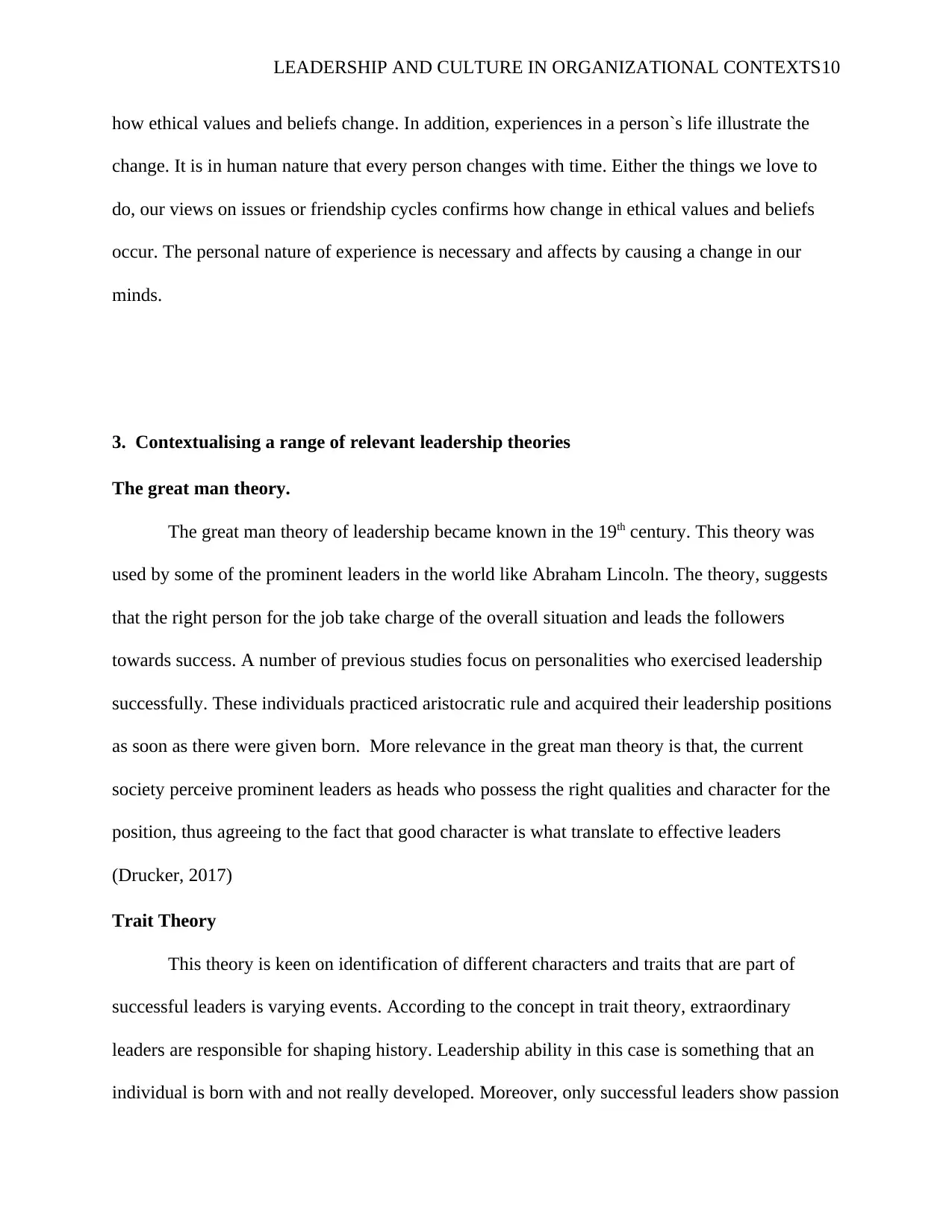
LEADERSHIP AND CULTURE IN ORGANIZATIONAL CONTEXTS10
how ethical values and beliefs change. In addition, experiences in a person`s life illustrate the
change. It is in human nature that every person changes with time. Either the things we love to
do, our views on issues or friendship cycles confirms how change in ethical values and beliefs
occur. The personal nature of experience is necessary and affects by causing a change in our
minds.
3. Contextualising a range of relevant leadership theories
The great man theory.
The great man theory of leadership became known in the 19th century. This theory was
used by some of the prominent leaders in the world like Abraham Lincoln. The theory, suggests
that the right person for the job take charge of the overall situation and leads the followers
towards success. A number of previous studies focus on personalities who exercised leadership
successfully. These individuals practiced aristocratic rule and acquired their leadership positions
as soon as there were given born. More relevance in the great man theory is that, the current
society perceive prominent leaders as heads who possess the right qualities and character for the
position, thus agreeing to the fact that good character is what translate to effective leaders
(Drucker, 2017)
Trait Theory
This theory is keen on identification of different characters and traits that are part of
successful leaders is varying events. According to the concept in trait theory, extraordinary
leaders are responsible for shaping history. Leadership ability in this case is something that an
individual is born with and not really developed. Moreover, only successful leaders show passion
how ethical values and beliefs change. In addition, experiences in a person`s life illustrate the
change. It is in human nature that every person changes with time. Either the things we love to
do, our views on issues or friendship cycles confirms how change in ethical values and beliefs
occur. The personal nature of experience is necessary and affects by causing a change in our
minds.
3. Contextualising a range of relevant leadership theories
The great man theory.
The great man theory of leadership became known in the 19th century. This theory was
used by some of the prominent leaders in the world like Abraham Lincoln. The theory, suggests
that the right person for the job take charge of the overall situation and leads the followers
towards success. A number of previous studies focus on personalities who exercised leadership
successfully. These individuals practiced aristocratic rule and acquired their leadership positions
as soon as there were given born. More relevance in the great man theory is that, the current
society perceive prominent leaders as heads who possess the right qualities and character for the
position, thus agreeing to the fact that good character is what translate to effective leaders
(Drucker, 2017)
Trait Theory
This theory is keen on identification of different characters and traits that are part of
successful leaders is varying events. According to the concept in trait theory, extraordinary
leaders are responsible for shaping history. Leadership ability in this case is something that an
individual is born with and not really developed. Moreover, only successful leaders show passion
Paraphrase This Document
Need a fresh take? Get an instant paraphrase of this document with our AI Paraphraser
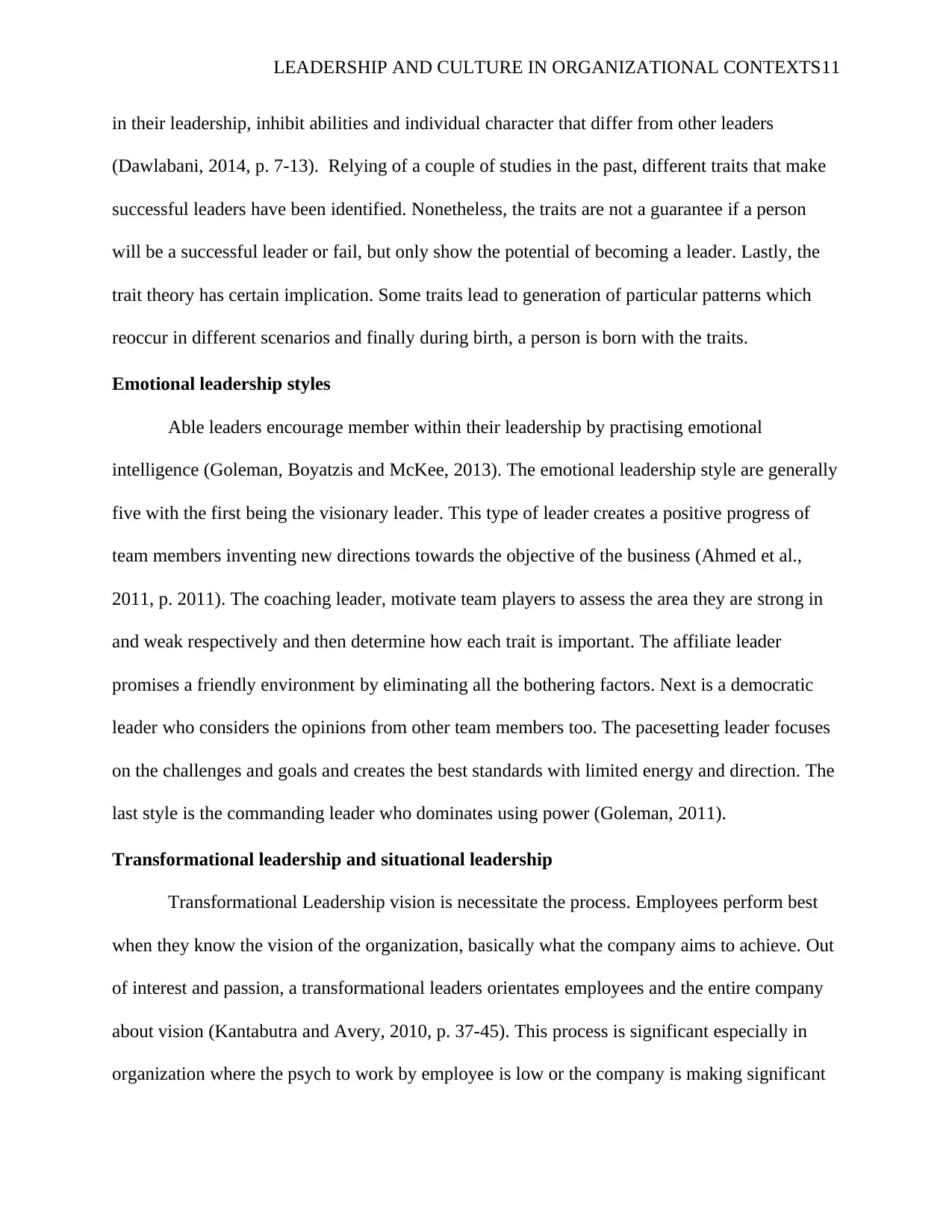
LEADERSHIP AND CULTURE IN ORGANIZATIONAL CONTEXTS11
in their leadership, inhibit abilities and individual character that differ from other leaders
(Dawlabani, 2014, p. 7-13). Relying of a couple of studies in the past, different traits that make
successful leaders have been identified. Nonetheless, the traits are not a guarantee if a person
will be a successful leader or fail, but only show the potential of becoming a leader. Lastly, the
trait theory has certain implication. Some traits lead to generation of particular patterns which
reoccur in different scenarios and finally during birth, a person is born with the traits.
Emotional leadership styles
Able leaders encourage member within their leadership by practising emotional
intelligence (Goleman, Boyatzis and McKee, 2013). The emotional leadership style are generally
five with the first being the visionary leader. This type of leader creates a positive progress of
team members inventing new directions towards the objective of the business (Ahmed et al.,
2011, p. 2011). The coaching leader, motivate team players to assess the area they are strong in
and weak respectively and then determine how each trait is important. The affiliate leader
promises a friendly environment by eliminating all the bothering factors. Next is a democratic
leader who considers the opinions from other team members too. The pacesetting leader focuses
on the challenges and goals and creates the best standards with limited energy and direction. The
last style is the commanding leader who dominates using power (Goleman, 2011).
Transformational leadership and situational leadership
Transformational Leadership vision is necessitate the process. Employees perform best
when they know the vision of the organization, basically what the company aims to achieve. Out
of interest and passion, a transformational leaders orientates employees and the entire company
about vision (Kantabutra and Avery, 2010, p. 37-45). This process is significant especially in
organization where the psych to work by employee is low or the company is making significant
in their leadership, inhibit abilities and individual character that differ from other leaders
(Dawlabani, 2014, p. 7-13). Relying of a couple of studies in the past, different traits that make
successful leaders have been identified. Nonetheless, the traits are not a guarantee if a person
will be a successful leader or fail, but only show the potential of becoming a leader. Lastly, the
trait theory has certain implication. Some traits lead to generation of particular patterns which
reoccur in different scenarios and finally during birth, a person is born with the traits.
Emotional leadership styles
Able leaders encourage member within their leadership by practising emotional
intelligence (Goleman, Boyatzis and McKee, 2013). The emotional leadership style are generally
five with the first being the visionary leader. This type of leader creates a positive progress of
team members inventing new directions towards the objective of the business (Ahmed et al.,
2011, p. 2011). The coaching leader, motivate team players to assess the area they are strong in
and weak respectively and then determine how each trait is important. The affiliate leader
promises a friendly environment by eliminating all the bothering factors. Next is a democratic
leader who considers the opinions from other team members too. The pacesetting leader focuses
on the challenges and goals and creates the best standards with limited energy and direction. The
last style is the commanding leader who dominates using power (Goleman, 2011).
Transformational leadership and situational leadership
Transformational Leadership vision is necessitate the process. Employees perform best
when they know the vision of the organization, basically what the company aims to achieve. Out
of interest and passion, a transformational leaders orientates employees and the entire company
about vision (Kantabutra and Avery, 2010, p. 37-45). This process is significant especially in
organization where the psych to work by employee is low or the company is making significant
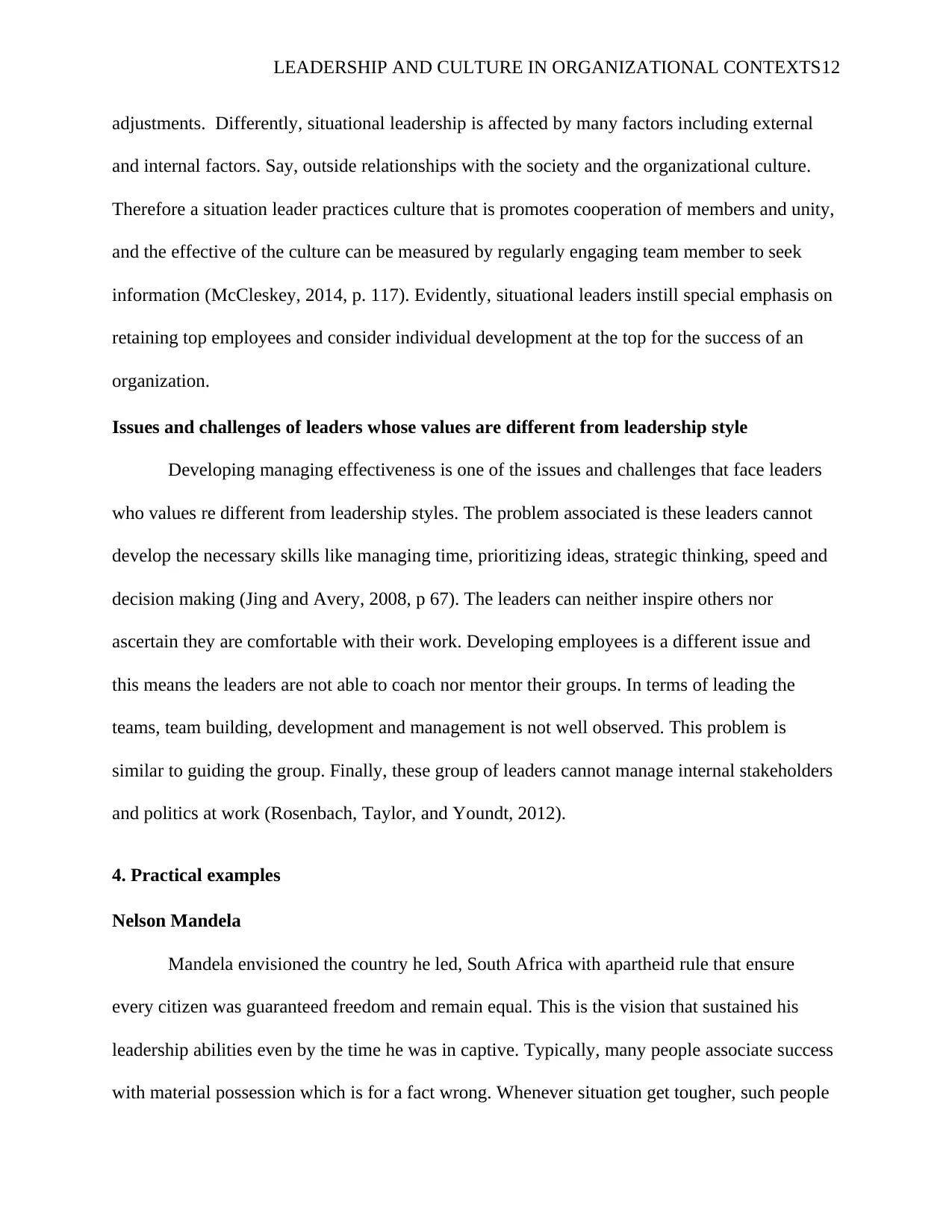
LEADERSHIP AND CULTURE IN ORGANIZATIONAL CONTEXTS12
adjustments. Differently, situational leadership is affected by many factors including external
and internal factors. Say, outside relationships with the society and the organizational culture.
Therefore a situation leader practices culture that is promotes cooperation of members and unity,
and the effective of the culture can be measured by regularly engaging team member to seek
information (McCleskey, 2014, p. 117). Evidently, situational leaders instill special emphasis on
retaining top employees and consider individual development at the top for the success of an
organization.
Issues and challenges of leaders whose values are different from leadership style
Developing managing effectiveness is one of the issues and challenges that face leaders
who values re different from leadership styles. The problem associated is these leaders cannot
develop the necessary skills like managing time, prioritizing ideas, strategic thinking, speed and
decision making (Jing and Avery, 2008, p 67). The leaders can neither inspire others nor
ascertain they are comfortable with their work. Developing employees is a different issue and
this means the leaders are not able to coach nor mentor their groups. In terms of leading the
teams, team building, development and management is not well observed. This problem is
similar to guiding the group. Finally, these group of leaders cannot manage internal stakeholders
and politics at work (Rosenbach, Taylor, and Youndt, 2012).
4. Practical examples
Nelson Mandela
Mandela envisioned the country he led, South Africa with apartheid rule that ensure
every citizen was guaranteed freedom and remain equal. This is the vision that sustained his
leadership abilities even by the time he was in captive. Typically, many people associate success
with material possession which is for a fact wrong. Whenever situation get tougher, such people
adjustments. Differently, situational leadership is affected by many factors including external
and internal factors. Say, outside relationships with the society and the organizational culture.
Therefore a situation leader practices culture that is promotes cooperation of members and unity,
and the effective of the culture can be measured by regularly engaging team member to seek
information (McCleskey, 2014, p. 117). Evidently, situational leaders instill special emphasis on
retaining top employees and consider individual development at the top for the success of an
organization.
Issues and challenges of leaders whose values are different from leadership style
Developing managing effectiveness is one of the issues and challenges that face leaders
who values re different from leadership styles. The problem associated is these leaders cannot
develop the necessary skills like managing time, prioritizing ideas, strategic thinking, speed and
decision making (Jing and Avery, 2008, p 67). The leaders can neither inspire others nor
ascertain they are comfortable with their work. Developing employees is a different issue and
this means the leaders are not able to coach nor mentor their groups. In terms of leading the
teams, team building, development and management is not well observed. This problem is
similar to guiding the group. Finally, these group of leaders cannot manage internal stakeholders
and politics at work (Rosenbach, Taylor, and Youndt, 2012).
4. Practical examples
Nelson Mandela
Mandela envisioned the country he led, South Africa with apartheid rule that ensure
every citizen was guaranteed freedom and remain equal. This is the vision that sustained his
leadership abilities even by the time he was in captive. Typically, many people associate success
with material possession which is for a fact wrong. Whenever situation get tougher, such people
⊘ This is a preview!⊘
Do you want full access?
Subscribe today to unlock all pages.

Trusted by 1+ million students worldwide
1 out of 18
Related Documents
Your All-in-One AI-Powered Toolkit for Academic Success.
+13062052269
info@desklib.com
Available 24*7 on WhatsApp / Email
![[object Object]](/_next/static/media/star-bottom.7253800d.svg)
Unlock your academic potential
Copyright © 2020–2026 A2Z Services. All Rights Reserved. Developed and managed by ZUCOL.



